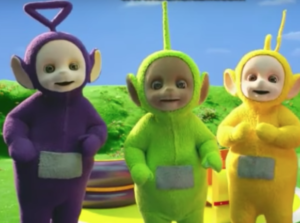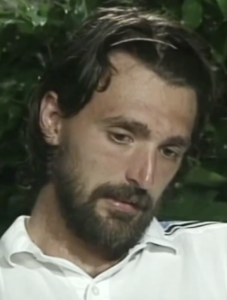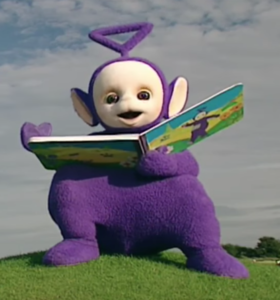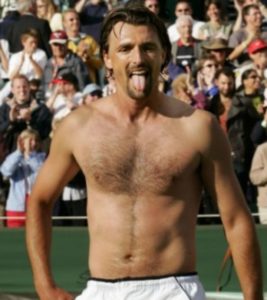I can be a little bit superstitious sometimes. Well, I like to call it superstition. Others might say that I’m neurotic. I definitely have some strange quirks.
But I don’t try to hide them. I’m open about them, and I’ve always gravitated towards people who are vulnerable and self-deprecating, willing to laugh at their own flaws.
For these reasons, I love Goran Ivanisevic.
Goran is a retired Croatian tennis player.
He was known for his powerful lefty serve. But he didn’t just serve with force. He smashed his racquets with a similar ferocity, leading to hefty fines.
Goran joked, “I pay more fines than some guys’ career prize money on the tour.”
He was eccentric.
He was a brilliant tactician. Once, in the middle of a doubles match, Goran switched sides in order to intentionally miss a volley, and give his team the game.
Ok, that was a charity doubles match after he retired. But it was still brilliant.
Goran knew how to get in his opponent’s head. He once pretended to strip in the middle of a match to distract his opponent.
Ok, that was during the same charity doubles match.
If you couldn’t already tell, Goran was uninhibited.
In his autobiography, Pete Sampras discussed how you did not want to miss an Ivanisevic interview.
“In the locker room, the players all stopped whatever they were doing and gathered around the television sets and turned up the volume when Goran was giving a press conference,” Sampras said.
“He handled those sessions like a guy on a psychiatrist’s couch, but always with great wit and charm. You just never knew what was going to come out of his mouth next.”
Goran was also extremely superstitious. If he was having success at a tournament, he had to follow the exact same routine to a T. And I don’t just mean on the court.
He’d have to eat the exact same food at the exact same restaurant at the exact same table. He’d have to park in the exact same spot. He’d even have to watch the exact same show.
One of these shows was Teletubbies.

This is the story of how Teletubbies helped carry Goran to one of the most iconic victories in tennis history.
But first, let’s go back a few years.
Goran was born in Split, Croatia in 1971.
As a youngster, he showed serious tennis potential. His family went all out in the hopes that he would make it big. In order to get him into a full-time tennis school, they sold their house, and moved into a crowded apartment.
When he was 17, Goran was about to leave to play Qualifying for the 1989 Australian Open.
But he received some tragic news. His older sister Srdjana had been diagnosed with Hodgkins Disease. Treatment for the disease was expensive. The family had already sacrificed everything to finance Goran’s career. Now, they’d have to use whatever they had left to fund Srdjana’s treatment.
Armed with the knowledge that the further he advanced in the tournament, the more prize money he would receive to help Srjdana, Goran travelled to Australia more determined than ever.
He won 7 consecutive matches, 3 in qualifying and 4 in the main draw to advance all the way to the Quarterfinals. His ranking shot up from 300 to 125 in the world.
Most importantly, he also received a nice payday for his quarterfinal result. Back then, the prize money was in cash, which made for an interesting flight.
“I was flying from Melbourne to Belgrade, and I had that pile of money with me, on my own on the plane. Man, I did not sleep a wink from Melbourne to Belgrade! All that money was in my jacket. The flight attendant asked me about 16 times if she should put the jacket away, and I was like: ‘No, it’s okay, I’m fine.'”
When he arrived home, Goran immediately gave the jacket, along with all of the cash inside of it, to his father in order to help fund Srdjana’s treatment.
Over the next few years, Goran became a consistent top 10 player on the ATP Tour. He won multiple tournaments.
But there are tournaments and there are Grand Slams.
The best players aren’t judged on how many tournaments they win, but on how many Grand Slams they capture.
And Goran hadn’t won a Grand Slam.
But if there was ever a Slam that Goran seemed destined to win, it was Wimbledon.
His forceful serve was most lethal on the grass at Wimbledon, where the ball stayed low. Pete Sampras once said that when Goran’s serve was on, it was basically unreturnable on grass.
In 1992, Goran reached the Wimbledon Finals, where he faced Andre Agassi.
Trailing 5-4 in the 5th set, Goran hit back to back double faults, bringing up Championship point for Agassi.
Goran stood dejectedly at the net, having to watch Andre collapse to the ground in celebration.
In 1994, Goran got a second chance.
He battled all the way to the Wimbledon finals, where he met Pete Sampras.
After losing the first two sets in tiebreakers, Goran wilted, falling 6-0 in the final set.
He was heartbroken yet again, but he knew that Pete had just been too good for him.
Over the next four years, Goran continued to make his mark on the Tour.
By the time Wimbledon rolled around in 1998, he had won 21 tournaments.
But he hadn’t won a Slam. And he hadn’t won Wimbledon.
It was time to rectify that. Again, Goran fought his way through the tournament.
In the semifinals, he outlasted Richard Krajicek 15-13 in a wild 5th set. He had advanced to his 3rd Wimbledon finals, where he would again face Pete Sampras.
For the last 4 years, Goran had thought about that Wimbledon loss to Pete.
Surely this year things would be different.
After winning the 1st set, Goran battled his way to a 2nd set tiebreak. He had two set points in that tiebreak to take a commanding two set lead.
But he lost both of those points, flubbing two 2nd serve returns into the net. Pete would win the tiebreak 11-9, evening the match at one set apiece.
The match went all the way to a 5th and deciding set. But in the biggest moment of his life, Goran failed to deliver yet again.
After hitting 30 aces in the first four sets, Goran hit just 2 aces in the fifth set. Pete won the set 6-2, and the Championship.
Goran was devastated.

Pete hadn’t been at his best, and Goran knew it. He’d just blown his best opportunity to win Wimbledon.
“Now it’s the worst moment of my life,” Goran said. “You know, I’ve had some bad moments, when you are sick or when somebody dies, but for me this is the worst thing ever.”
Goran became depressed. He would be in the middle of a match and get distracted, thinking of his Wimbledon loss.
“After that match things started going downhill. I couldn’t get over it.”
In 2000, Goran lost in the first round of the French Open, Wimbledon, and US Open.
After being a consistent top 10 player, he had fallen all the way to 136 in the world in November 2000. He had fallen so far that he was going to have to play qualifying just to make the Australian Open.
But he still had one tournament to play in Brighton, England. If he did well enough, he could gain enough ranking points to qualify directly for the Australian Open in January.
Instead, Goran managed to accomplish a feat that had never been done in the history of tennis.
That’s right, Goran had to retire mid-match because he’d broken all of his racquets and didn’t have any racquets left.
When Goran was asked about that many years later, he joked, “Kids, don’t do that at home ever! Have more racquets so you can break more.”
Goran travelled to Melbourne to play qualifying for the 2001 Australian Open. But he hadn’t had to play qualifying for many years, and unlike the main draw events, the courts for qualifying are often off the main tournament site.
“I had no idea where the court was, I was looking for it and I was going crazy,” said Ivanisevic. “It was 800 degrees outside, and I couldn’t find the court I was meant to be playing on! And I was thinking: ‘Bloody hell, is it possible that I’ve reduced myself to this?’ Let alone that I was back playing a qualifier, now I couldn’t find the court.”
When Goran finally did find the court, he promptly lost to Petr Luxa, a player who never won a Grand Slam Main Draw match, and had a career high ranking of 150 in the world.
Goran had hit rock bottom.
Later in 2001, Goran’s ranking wasn’t high enough to get into the Main Draw at Wimbledon. But as luck would have it, he was given a Wild Card directly into the Main Draw.
Unfortunately, his left shoulder was in extreme pain, forcing him to take 5 or 6 painkillers a night. He was told that the shoulder was going to need surgery. But Goran wasn’t going to miss Wimbledon.
Still, no male Wild Card had ever won a Grand Slam, much less Wimbledon. He didn’t have much of a chance.
Early in the tournament, Goran’s coach introduced him to a children’s television show called Teletubbies.
“My coach one day said: ‘You have to watch this, this is so funny.’ And I won my match that day. So then I couldn’t stop. My favourite was the purple one, Tinky Winky.”

For the rest of the tournmanent, Goran woke up every morning and couldn’t get out of bed until he had watched Teletubbies.
“I started to watch and every day was Teletubbies time.”
In the 3rd round, Goran faced an 18 year old up-and-coming American by the name of Andy Roddick. He took down Roddick in a close match, and began another Goran Wimbledon tradition.
He took off his shirt, and flung it up into the crowd.
Much to the delight of female spectators, Goran would continue to strip after each unexpected victory.

After an impressive win in the round of 16, Goran was asked about his wonky shoulder.
“Is still painful, still hurts, still have to do operation….But like I say, I’m not going to lose here because of my shoulder. Somebody wants to beat me, has to beat me. If my shoulder falls off, is bad luck, you know. But I am praying every night not to fall off and to hit some aces. So far is working fine.”
In the semifinals, Goran met the affable Brit, Tim Henman.
No man from the UK had won Wimbledon since 1936, and Tim was their best hope in a very long time. Henman had beaten Goran in all four of their previous matches, and the Brits were ready to see their man in the finals.
“I got up in the morning and I was watching their TV coverage, and everyone was already talking about Henman playing in the final. Apparently I didn’t even have to walk on to the court, Henman was already in the final.”
At one set apiece, Henman began to dominate. With the British crowd in a frenzy, Tim breezed through the 3rd set 6-0, and went up 2-1 early in the 4th set. With the momentum firmly in Tim’s corner, it looked like Goran’s Wimbledon dream was coming to an end.
But then, a few rain drops hit. The rain increased, delaying the match until the next day. Goran was given a break from the onslaught, and a chance to regroup.
Goran struggled to sleep through the night, but he couldn’t sleep in too late either.
“9:30 I said ‘Okay, is enough, get up.’ Teletubby starts at 10:00 so you have to watch.”
When the match resumed the following day, Goran got his groove back. He squeaked out a 4th set tiebreaker, and got a match point on his serve at 5-3 in the 5th set.
The Wild Card who had been lucky just to get into Wimbledon had made it all the way to the Finals.
Following the match, Goran thanked the man upstairs.
At the press conference later Goran said, “If some angel comes tonight in my dreams and say, ‘Okay, Goran, you going to win Wimbledon tomorrow, but you not able to touch the racquet ever again in your life,’ I say, ‘Okay’. I rather take that and then never play tennis again in my life.”
With the finals against Patrick Rafter the next day, Goran didn’t sleep much that night.
“I woke up at 2 and went back to sleep at 3. I woke up at 4 and went back to sleep at 5. When I woke The Teletubbies were on TV, so I thought it must be time to get up.”
Goran never made it easy on himself. The 2001 Wimbledon Finals was no exception.
At 7 games all in the 5th set, Goran had a break point to take an 8-7 lead.
Goran’s service break meant that he would serve for the Championship.
Four points later, it was 30-all. Goran was just two points away from the Wimbledon dream that had tortured him for so long.
Goran’s ace up the tee brought up Championship point. True to his superstitious nature, he patiently waited for the ball boy to retrieve the same ball he had just hit an ace with. With tears in his eyes, he looks skyward, praying for one final point.
But Goran double faulted bringing the score back to deuce. He soon had another Championship point. But, in true Goran fashion, he double faulted again. At deuce, he was still two points away.
Rafter’s backhand slice sailed just wide. Goran piously crossed himself, and prayed on the spot where Rafter’s ball had just missed. He had to win now. Surely he couldn’t blow a 3rd Championship point.
Rafter’s backhand lob forced a 4th deuce, sending the crowd into hysterics.
Goran soon brought up a 4th Championship point, and even he could only blow so many chances.
He had done it. After all the years, and all the anguish, Goran had finally won Wimbledon.
Hoisting the trophy, he said that he would keep it next to his bed for the rest of his life.
“Not in the bed?” a reporter asked.
“Not in the bed. Different thing in the bed.” Goran cracked.
Goran returned to Split, Croatia to celebrate.
If you think you’ve been to a party, you should’ve been in Split when Goran returned after winning Wimbledon. More than 100,000 people lined the streets. There were guns going off. There were firemen spraying their hoses to the skies.
There were even three young men dancing around the streets chanting “Teletubbies”.
One individual crashed his car, but the police let him off without a ticket, because he was suffering from “extraordinary emotion”.
To the dismay of the crowd, Goran kept his clothes on.
Just kidding. Of course he didn’t.
After winning Wimbledon in 2001, Goran struggled with injuries over the next few years. But he refused to give up.
“When I won Wimbledon, I said to God: just let me win this one tournament and I won’t play another match. Maybe God’s telling me to go home, but I don’t want to go home. We are negotiating at the moment.”
In 2004, with Goran’s career nearing an end, he was left off of the 2004 ATP Player Guide. Goran was perplexed. “But I’m the main sponsor for the tour! I’m the guy who paid the most fines, so they should give me respect. There should be a page saying ‘This is the guy who paid the most fines.’”
Goran retired later that year, playing the final match of his career at Wimbledon.
As much as he missed the game, there were definitely some perks to retirement.
He was no longer obligated to watch Teletubbies.
“It’s nice not to have to watch it anymore,” he said.
Don’t be mistaken. He still watched Teletubbies. He just didn’t HAVE to anymore.
Goran was one asked if he ever abandoned any of his superstitious rituals.
“I didn’t. They do work. I won Wimbledon.”
Really interesting read!! Lesson learned always bring more rackets to break.
Goran was my first tennis love…Thank you for this article.
Me too, Jodie!
A great read!
Great story very well told!
I just went through the story again. I remember it like it was yesterday so THANKS! And remember that shot he hit against Henman on his knees? So many more things. Remember he did that bit with the different personalities? Like Jodie said, he was my first tennis crush. THANK YOU SO MUCH for the memories!!!